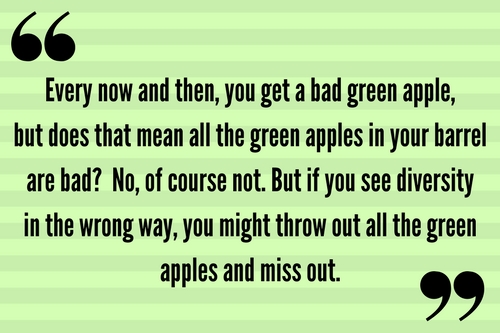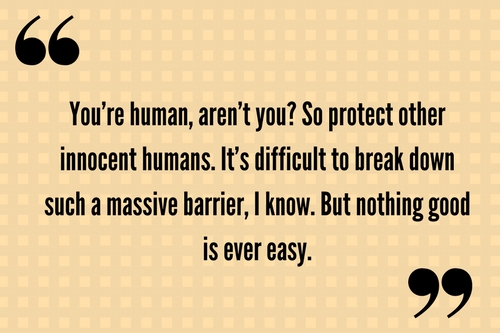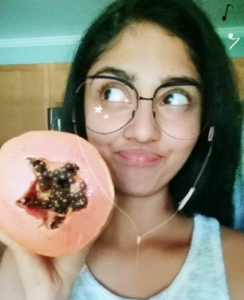Hey everyone! I apologize for not posting last Tuesday. I had a rather hectic week. I may need to readjust my posting schedule in the next couple of weeks as I am about to enter college. I will keep you posted on that : )
During my senior year of high school, I had the pleasure of meeting this week’s Quintessentially American subject. Ash’s story is particularly interesting as she not only experienced being an immigrant in the United States, but also in England. She has such a diversified and intelligent perspective on culture and how it defines us as human beings.
I hope you enjoy and learn from her story as much as I did!

Quintessentially American:
Meet Ash from Sri Lanka
Where are you from originally?
I am originally from Sri Lanka, which is the little raindrop shaped island below India. When I was around 3 years old, I moved to England with my mom and dad. My sister was born there in 2005.
Why did you move from Sri Lanka to England?
We moved because my mom wanted to pursue her PhD and she got accepted into a university in England. After she finished her studies, we decided to stay there.
What memory do you have of Sri Lanka?
I went back to Sri Lanka very often after our move. Sinhalese people have very tight family ties, so I feel really connected to the country and hence we try to visit every 3 or 4 years, the last time being in 2013.
Do you identify yourself as Sri Lankan?
Yes I do, answering that question was easy in England, as most who asked it wanted to know where I was born. In America it’s a little more complex, as most are asking to know where I get my accent from. However, more so than “Sri Lankan” I identify as Sinhalese. There are several ethnicities in the country including Tamils and Moors who speak different languages and come from different parts of the world. The Sinhalese, which I am, are the largest ethnic group and we speak Sinhala.

How was your transition from Sri Lanka to England?
When I moved, I didn’t know English. One day my mom took me to a ballet class. It’s so funny because when the teacher instructed me to “tip-toe”, I stomped. Afterwards, my mom asked me if I enjoyed ballet and after telling her no, she put me in swimming because I could always swim. Luckily, I was still very young when I moved, so learning English came easily, as did many things, but I can’t say it was easy for my parents.
How was the experience of being an immigrant in England?
London is very diverse and full of many cultures, but I grew up in Reading. Even though it was less than an hour away from London, it was different – at least, in my neighborhood. I did feel separate from English society, especially in the prestigious Catholic primary school I attended. I can happily say I was the only brown person there for around 7 years. Everyone was white. Everyone was rich. The fact that I stood out so starkly could have factored into why I didn’t have a brilliant time in primary school. It got a lot better when I went to secondary school though – it was not a religious school, but an all-girls institution. We had a lot of girls from different cultures sent there by their families – we had Islamic girls, Buddhist girls, Christians, Jews and everyone from all over the world. The school was in a different neighborhood than my primary school, and the difference was amazing.
To what extent would you consider yourself British?
When people asked me in England where I was from, I’d automatically say Sri Lanka. But now, living in the States, people ask me and hear my British accent. I tell them I lived in England, but I am from Sri Lanka. My roots are in Sri Lanka, despite having a British passport. My whole family is over there and I feel very connected to them. However, England has affected me a lot – that country has given me massive opportunity and I can’t ignore the fact that most of my life was spent there.
Why did you move to the U.S.?
We moved here in the summer of 2016 after my dad remarried, but the educational opportunity was also a pull. America has the reputation of being the land of freedom, and it really is. Despite the critique on America’s grade education system, the freedom you have in an American school is extremely beneficial to students who are self-driven (although not so much for others, hence its flaw). You can choose to do all the easiest classes and breeze through school or do all the hardest ones and prepare yourself for an early death or whatever! There’s nothing stopping you. In England, you only take 3 subjects in your junior or senior year; 4 if you want to be a high achiever – this is to ensure that no one does too little or too much. The classes are limited to the basic math, science, English, economics, etc. So for someone like me who wants to learn a little of everything, it was frustrating. As soon as I came to America and learnt that I could take Chinese, a language I had always wanted to learn due to its growing influence in both the world and Sri Lanka, I was ecstatic and enrolled straight away. I also loved psychology – a class that’s almost never offered in the UK at secondary school.
How do you hope to harness the opportunity in America?
I want to get into engineering at best university I can and establish myself here, but my main goal is with Sri Lanka. I see the poverty there, and I really want to help by going back and using the skills I’d have learnt here. My grandfather has written over some land to me and I want to use it for good by creating affordable housing on the area or build a school – that kind of thing. I’ve been looking for environmental, civil and architectural engineering programs here at American universities, as building and designing are what I seem to be good at. I hope to eventually improve buildings and other infrastructure in Sri Lanka with my education here.

How was the transition from England to America?
It was a lot more different than I thought it would be. I thought it would be just like England, but it isn’t – the racial tension is extremely tangible, especially with America’s vivid history of slavery. England has racism, and any racism is too much racism, but in comparison it isn’t that much to be honest. When you come here, it is super evident. The racial history continues as it was only – what, 200 years ago that slavery was abolished here? That’s not a long time at all, and you can still feel the scars when a subject like that is brought up.
Did you think, prior to moving, that America had overcome these tensions?
Yeah. I didn’t study American history in England so I didn’t know that much to begin with. I knew slavery was a thing, but didn’t expect the tensions from it to linger so strongly. I thought racism had faded to England’s standard, especially with Obama’s presidency. I also thought it was a great step forward to lower the Confederate flag, but I see there are so many people that resent that move. With the election and Trump’s presidency, these tensions are being brought back to the surface. Those tensions are never going to leave if you don’t let it go and move forward. No one seems willing to do that. That’s where it is really depressing.
Do you see any comparison of the 45th presidency to Brexit?
Brexit is not so much a social thing as it is an economic thing. At first I thought, ‘Oh my god, we’re doomed!’, but now I feel like I’m on the fence. I know there are going to be a lot more problems in regards to immigration, but I’m not sure what the overall social effect is going to be. Economically, I see the benefit. It’s countries within the EU like England that stabilize the union. When another country is in financial trouble, it negatively affects the British economy. That’s why people in England decided to become independent; the country is strong enough to do so.
How do you feel about your experience living in 3 different countries [Sri Lanka, England and U.S]?
I like it that way because I have more perspectives of the world I am seeing. Not only visiting countries, but also being able to live there and integrate is really interesting. You see how people think inside society instead of just looking at it from the outside. It’s very useful.

How is it useful?
I’ve learned that there are prejudices everywhere. Some people can’t be changed. When you are in a society, a prejudice might just be the norm. A lot of cultures, despite being extremely different, can have worryingly homogenous aspects. For example in Sri Lanka, the Sinhalese and the Tamils are divided. In England, the different religious backgrounds are somewhat divided. Now, coming in the States, I see how races are divided. Ironically, because of this, I see that people are the same no matter where they are from. They all act against minorities. People can’t say things would be different if the tables were turned because that’s not human nature – it would be exactly the same. We need to fight against this, live with more civility than the generations before us and unite.
How can we work together to bring about unity?
Through awareness. Back in England, I knew what it was like in primary school to be surrounded solely by one group of people, and because of this I was very narrow minded. My diverse secondary school environment was like an alarm clock and helped me gain open-mindedness. It upsets me hearing all these Americans saying things like, “Don’t let Muslims in”, when the people creating problems aren’t even Muslim. Similar things can be applied to other minorities. The fact that if it weren’t for my secondary school I might’ve agreed to these ideas upsets me even more. I think awareness is the key- too many people talk without knowing what they’re saying these days, and too many people look at themselves and say “I belong to this group of people so they should be the only ones I defend”. No. You’re human, aren’t you? So protect other innocent humans. It’s difficult to break down such a massive barrier, I know. But nothing good is ever easy.
How is diversity beautiful?
Diversity is what makes our planet the most beautiful in the solar system, and the variety of people and faces and cultures in this world are an aspect of that beauty. I’ve talked about how people can be the same but look different across oceans. Understanding diversity, and appreciating it needs to be balanced with, promotes the understanding that inside we are all similar despite our exterior looks. Every now and then, you get a bad green apple, but does that mean all the green apples in your barrel are bad? No, of course not. But if you see diversity in the wrong way, you might throw out all the green apples and miss out. So understanding diversity and its beauty is something us, as a human race, need to work on.
–

What culture are you the most fascinated by?
(answer in comment section)
Thanks for reading! If you, or anyone you know, is an immigrant please let me know. I’d love to showcase as many people as I can. Make sure to SHARE, COMMENT, and SUBSCRIBE VIA EMAIL (right sidebar) and/or TEXT (txt. @theindie to 81010).

